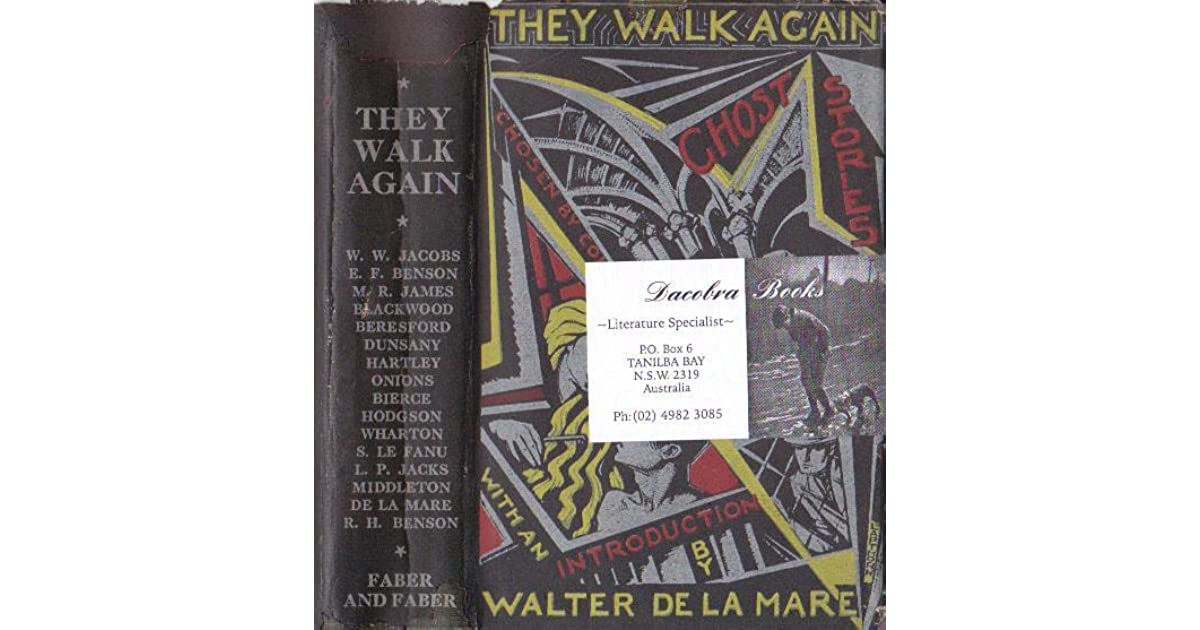Lifting Veils

I’ve come to the end of reading The Ghost Book, or They Walk Again: a Collection of the Best Ghost Stories collection.
My edition is an erroneous reprint from 1941. Don’t know how it ended up in my possession. One of the printing signatures has been repeated, substituting out the correct pages and chopping out two and a half stories. It’s an oddity, and a very damaged edition, that has reached the point where the acid makes the pages crack and split when I try and turn them and the spine hang together at a scoliotic angle.
The stories are the usual mix; some are wonderful, with EF Benson’s ‘Caterpillars’ being a stand out, though I was also taken by William Hope Hodgson and WW Jacobs’ memorable contributions. Some are farcical to the point of being irritating; Richard Middleton’s ‘The Ghost Ship’ annoyed me tremendously with its lack of any serious point, reminding me of recent episodes of Dr Who and similar BBC codswallop forays into weird genres.
Yet others were simply tedious, Walter de la Mare’s ‘All Hallows being the longest at forty or so pages, though the poetry of his style offered a marginal edge on the shorter, but near-turgidity of J. Sheridan le Fanu’s ‘Green Tea’. The latter was only rescued from my total loathing by the penultimate, climactic episode, where the language stripped back its excess convolutions to enhance the grisly descriptions therein, before descending back into turgidity for its final, odious, orientalising conclusion.
I wrote this before finishing the last story, Algernon Blackwood’s ‘The Wood of the Dead’, for a line that stopped me dead (ha-ha) in my tracks:
“Involuntarily I clutched the arm of the settle for support, for I then felt that I was speaking with someone who knew more of the real things that are and will be, than I could ever know while in the body, working through the ordinary channels of sense–and this curious half-promise of a partial lifting of the veil had its undeniable effect upon me.”
That ‘lifting of the veil’ is crucial to the genre of weird fiction. Each of the best weird stories I’ve read seem to chart an encounter with the inexplicable just beyond the limits of societal norms, or perceivable reality.
As a metaphor, you could say it’s the end product of the Enlightenment’s dismantling of Christian cosmology in the West. Scientific rationalism hadn’t taken away humanity’s ability to believe in something beyond the veil of material perception. It had only put a stake through the heart of an all-benevolent and omniscient mythos.
This left a void, which repeatedly manifests as an encounter with cosmic horror. Cosmic, cosmos, cosmology. The new mythoi for explaining the purpose of the human-subjected world were a monstrous, chaos of power grabs, idiosyncracies, cultural divergences and minor narratives assaulting the grand.
Let’s say we draw up a table of traits about the Christian God against traits for Cthulhu and Co. We’d come up with one important match: unknowable. That won’t stop anyone trying, in both cosmologies, to know the will of the ineffable, but for writers of the weird after the rise of scientific rationalism, there’s only horror at how duped, how ignorant, humanity is. Why believe any single authority, any idiot’s version of reality’s purpose, as if it is objective fact? If the Unknowable refuses to manifest, every narrative about the Unknowable becomes story, the flawed belief of a human.
Any lifting of the veil seems comparable. Take the major whistleblowers of our day, like Chelsea Manning and Edward Snowden. Each attempted to lift the veil on the material layers of fiction blinding us to the world’s true power, which were themselves only new versions of the fictions we abide to get through our days.
You might say scientific rationalism, and its reductivist extension of objectivity and atomism, has lowered a veil of its own across our eyes. The horror, each time I’m forced to confront the utterly subjective will of power to present social operations as being as inevitable as gravity – the Thatcherite vision that There Is No Alternative as intolerably false as the Marxist-Communist veil of a narrative of society’s inevitable arrival at a single, worker-class stratum, or Fukuyama’s mercifully abandoned assumptions about historical ends.
Lifting veils, time after time, only reinforces the feedback loop of its own gesture. Veils were always put in place to protect ourselves from ourselves by humans deceiving other humans. Behind layers and layers of scrim, we might hope desperately to find the Wizard of Oz pulling levers and squawking into his microphone like a gnarly Cocteau, but the only sensation left to us is the sense that we’ve lifted a veil and found another veil to scrutinise, until we find its edges and can lift that too.
Surface after surface, veil after veil, going around in circles finding nothing beyond the human. That, there, the real horror of existence. When lifting veils becomes intolerable too, is there anything left?
I guess there’s the pleasure in the story, which, for me, is weird fiction’s consolation.
